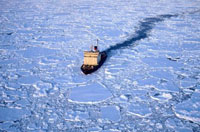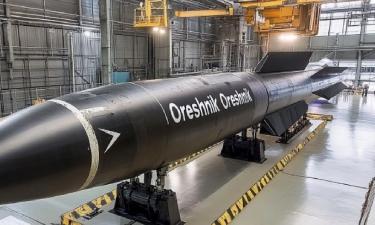NATO to melt Arctic ice as it triggers yet another international scandal
The endless desert of snow and ice has always been a subject for dispute among politicians, diplomats and scientists. The Arctic territory has now become a subject of a military dispute: NATO declared it a strategically important region. The alliance intends to increase its contingent in this part of the globe.

The announcement was voiced by NATO spokesman James Appathurai. The official particularly said that NATO has a long-term strategic interest in the region. He also announced a meeting with the participation of high-ranking officials of the alliance: the meeting is to take place January 28-29 in Reykjavik. NATO’s Secretary General, the commander of NATO’s allied forces in Europe, the commander for transformation and the head of the defense committee of the alliance will take part in the meeting too.
The entry list does not leave any doubts about NATO’s real goals in the region. The decision of the alliance to declare the northern territories as strategically important will create a tense international situation in the region. The struggle for the Arctic has become the subject of long-term military games. One may not doubt that they will send military units to the Arctic sooner or later.
Those, who follow the affairs around the Arctic territories, understand that Appathurai’s remarks became a continuation of the initiatives outlined in the US national security directive. The document says that Washington has fundamental national interests in the Arctic region. The interests are defined as follows: missile defense, strategic deterrence, marine security operations. There are no references to terrorists or pirates, who prefer the warm waters off the coast of Somali , but not polar bears.
Scientists say that the warming of the Arctic region takes place twice as fast as on the rest of the planet. UN Secretary General Ban Ki-Moon said that the ice core of Greenland melts faster than anyone could ever suppose. As a result, the waters of the region will become navigable for both civil and war ships.
The USA, Canada and NATO do not conceal why they need a military group deployed in the Arctic region. NATO’s ice-breakers will arrive in the region to defend national interests of those members of the alliance who claim their right for the natural wealth of this part of the planet. The Arctic contains about 90 billion barrels of unexplored crude and enormous reserves of natural gas, which could be comparable to those of Russia. They make up about 30 percent of global gas reserves.
Russia will be using many of its Arctic gas deposits to extract about 50 percent of its natural gas by 2030. For example, the Shtokman deposit in the Barents Sea contains 4 trillion cubic meters of gas.
Russia is ready to take adequate measures in response against such a background. That is why NATO is trying to stake out a claim in the region. Russia’s marine doctrine, which was signed during Putin’s presidency, points out the Arctic territory as one of the major directions of the naval policy.
Russia’s Security Council is to unveil a new strategy of the Arctic development at the end of January. The key message of the document will be as follows: “Russia is not going to give the Arctic away.”
Russia also plans to considerably intensify the freight traffic activity on the Northern Seaway during the upcoming years. Six new powerful ice-breakers will be built before 2020 for this purpose, Russia ’s Minister for Transport, Igor Levitin said.
Five countries of the Arctic Ocean – Russia, Canada, the USA, Norway and Denmark – made a reasonable decision last year to negotiate the separation of the Arctic region on the base of existent conventions only.
However, NATO’s plans to add a military constituent to the Arctic dialogue may lead to drastic changes in the approach to the current issues. A new hotspot may appear on the map of the world.
Vladimir Anokhin
Subscribe to Pravda.Ru Telegram channel, Facebook, RSS!


